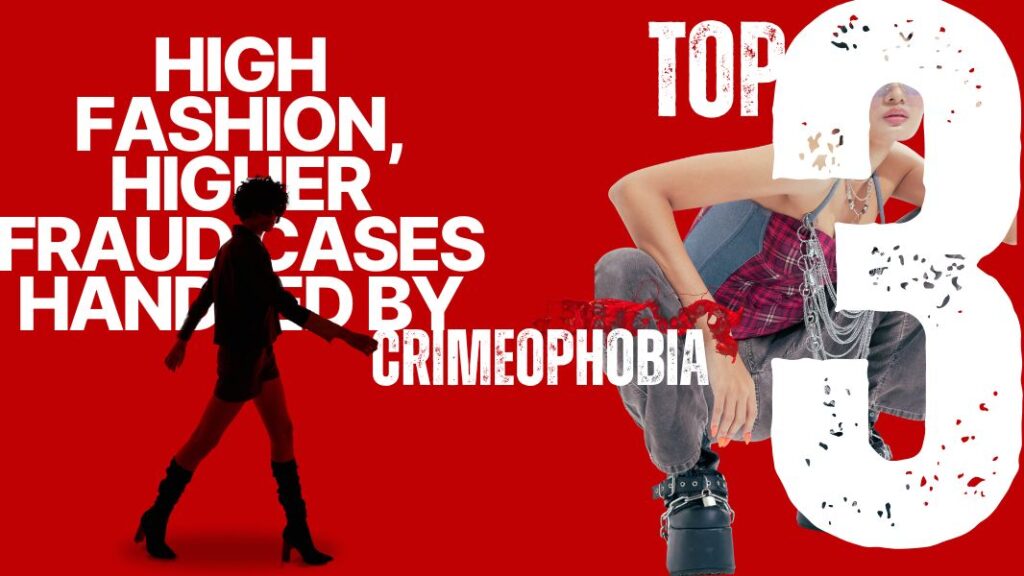
Top 3 High Fashion, Higher Fraud Cases Handled by Crimeophobia That Highlight the Dark Side of India’s Glamour Industry
by Fashion Desk; Crimeophobia Bureau
From interacting in global conversations around the #ChappalChor controversy involving an international luxury brand to investigating client fraud linked to a top Indian luxury fashion designer, Crimeophobia has navigated the journey from dialogue to deep investigation—uncovering its top 3 hidden crimes in the glamour and garment industry, across textile mills, luxury boutiques, and the e-commerce platforms where fashion meets fraud.
Maharashtra – The convergence of fashion and finance has turned India’s vibrant textile and apparel sector into an emerging battleground for fraud, counterfeiting, and organized crime. Unveiling this darker undercurrent, global criminology firm Crimeophobia, led by Criminologist Snehil Dhall, has exposed a series of high-profile scams impacting textile manufacturers, luxury fashion houses, and e-commerce platforms catering exclusively to the fashion industry.
At a recent roundtable hosted by The Indian Express group, Dhall raised critical questions about the infamous “Prada fraud”—popularly dubbed by Indian consumers as #ChappalChor—and the broader implications on India’s intellectual property and brand protection. Responding with clarity and conviction, Shri Deependra Singh Kushwah, IAS (2006 batch, Maharashtra cadre), emphasized that global brands would be held accountable for design thefts like the one involving the Kolhapuri chappal. He highlighted the government’s efforts through Geographical Indication (GI) tagging to safeguard indigenous products, not just from Maharashtra but across India. His remarks carried institutional weight, given his key roles as Commissioner of Skill Development, Development Commissioner (Industries), Chairman of MAITRI (Maharashtra Industry, Trade & Investment Facilitation Cell), and Governing Council Chair of MCED (Maharashtra Centre for Entrepreneurship Development).
But beyond conference discussions and official statements, Crimeophobia’s investigations have ventured deep into the world of high fashion frauds—where the crimes are as intricate as the couture.
1. Textile Manufacturer’s Fund Recovery: A Case from Maharashtra’s Textile Capital
In a major case stemming from Ichalkaranji—often dubbed the ‘Textile Capital of Maharashtra’—a high-value B2B financial fraud unfolded when a buyer purchased products worth several million rupees without executing any formal documentation, receipts, or agreements. This informal trade structure, unfortunately common in the textile industry, leaves manufacturers vulnerable. In this particular case, the buyer vanished after the consignment was received, leaving the agencies in Mumbai in the middle of partial or zero legal documentation for registering the crime or approaching the court.
Crimeophobia’s team stepped in, tracing the accused through strategic contacts and leveraging prior associations with builder clients familiar with the firm’s forensic documentation and criminal psychological audit strategies. Through a detailed arbitration process, the accused acknowledged and confessed to the payable dues after consultation with extended family members and agreed to a structured recovery plan. The arbitration concluded successfully, and the full amount was recovered, preventing what could have otherwise resulted in severe business and financial losses.
2. The Indian Luxury Fashion Designer’s Lehenga Scam: Multi-Million High Fashion Turned into Emotional Nightmares
In another dramatic turn, Crimeophobia handled a discreet case involving one of India’s top luxury fashion designers. Designer lehengas valued between ₹5 to ₹15 lakhs were reportedly delivered, but multiple clients claimed they never received them. Maintaining the brand philosophy of “The client is always right,” the issue posed a severe risk to brand credibility and public trust.
Given the sensitivity, Criminologist Snehil Dhall was specially engaged to resolve the issue without damaging the designer’s reputation. An undercover operation was staged at the luxury designer boutique, where employees were individually and collectively interrogated without revealing the investigation’s purpose. The culprit was identified discreetly during a group session. Instead of initiating legal charges, which could trigger a public scandal, the staff members involved were given a confidential settlement and allowed to resign quietly on the same day. The internal theft was resolved with zero damage to the brand’s image or market standing.
3. E-Commerce Fashion Scam: Vendors Trapped in a Bankruptcy Blackhole
The realm of online retail offered no fewer challenges. In a complex fraud involving a prominent e-commerce fashion platform, vendors who sold fashion accessories and apparel were denied compensation despite fulfilling their supply obligations. The company later declared bankruptcy and was acquired by a competitor, complicating the fund recovery process further.
Crimeophobia was tasked with resolving the dispute for one of its vendor clients. During interactions with the e-commerce firm’s accounts department, disturbing conduct was uncovered where a department head exhibited behaviour that constituted sexual misconduct—without the victim realizing the legal gravity of the actions. Legal notice and arbitration followed, in which everyone involved was background-checked prior to meetings. A critical agreement was reached: the e-commerce firm would repay the vendor’s dues if Crimeophobia agreed not to represent other vendors with similar claims. The firm chose to honour this commitment, ensuring their client received payment within a specific time window.
Crimes That Cross Couture and Corporate Borders
From the open-ended credit norms of India’s textile manufacturing hubs to the secretive showrooms of high-end designer wear, and the legal grey areas of digital retail—Crimeophobia has operated on all fronts and levels of the high luxury fashion industry. The team has not only tracked culprits and conducted undercover interrogations but also managed to recover substantial dues while maintaining client reputations and upholding ethical standards.
In Dhall’s words, “We don’t just fight for justice—we prevent chaos from becoming public damage.”
As the Indian fashion and textile industries scale new heights, the need for organized forensic auditing, criminological intervention, and preventive legal mechanisms is clearer than ever. Crimeophobia’s interventions in this sector showcase how modern crime-fighting must evolve beyond courtrooms and into boardrooms, boutiques, and beyond.
